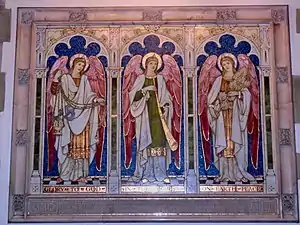Julius Caesar Czarnikow
Julius Caesar Czarnikow (1838 – 17 April 1909) was a German-born, London-based sugar broker and investor.
Julius Caesar Czarnikow | |
|---|---|
| Born | 1838 Sondershausen, Germany |
| Died | 17 April 1909 (aged 70–71) London, England |
| Occupation | Sugar broker |
| Net worth | GBP£1 million[1] |
| Parent(s) | Moritz Czarnikow Johanne Bar |
Early life
Julius Caesar Czarnikow was born in 1838 in Sondershausen, Germany.[2][3] He was of Polish Jewish descent.[4] His father was Moritz Czarnikow and his mother, Johanne Bar.[3] He was baptized 1862 in Berlin, and married in 1863 Holy Trinity, Clapham.
Czarnikow moved to England in 1854,[5] and he became a British subject in 1861.[6] He resided in Effingham Hill House and Eaton Square (1901 census), London. He married Louisa Ellen Ashlin (1840-1911), with whom he had 2 children : Horace (1864 -1933), and Louisa Ada (1867-1948).
Career
Czarnikow founded a sugar brokerage firm, Czarnikow & Co., in 1861, which now trades as Czarnikow Group Ltd.[6] Its first office was at 18 Philpot Lane, London,[7] and the compant later had offices in Liverpool, Glasgow and New York City.[2] He partnered with Manuel Rionda of Cuba, who admitted to Czarnikow in 1909 that he struggled to find the right chemist for sugar manufacturing.[8]
Czarnikow was an investor in a sugar shipping company from the West Indies to Central Europe.[1] By 1872, he was also the largest investor in the South Carolina Phosphate Company.[9] Additionally, by 1888 he was an investor in the London Produce Clearing House,[1] and he served as its deputy chairman.[6]
Death

Czarnikow died on 17 April 1909 in London.[10] By the time of his death, "he was said to be the biggest sugar broker in the world",[10] with an estimated wealth of £1 million.[1]
At Probate in 1909 his executors included Julius Charles Ganzoni (born 1852 in Austria, died 1949 in Cambridgeshire); the 1911 census stated he was a partner in a firm of colonial brokers, and his son Francis J Childs Ganzoni (born 1882) was a barrister.
References
- Chapman, Stanley D. (1992). Merchant enterprise in Britain : from the Industrial Revolution to World War I. Cambridge, U.K.: Cambridge University Press. pp. 77–78. ISBN 9780521351782. OCLC 23694086.
- "OBITUARY". Journal of the Royal Society of Arts. 57 (2944): 465. 23 April 1909. JSTOR 41338589.
- Orbell, John. "Czarnikow, (Julius) Caesar (1838–1909), sugar broker". Oxford Index. Oxford University Press. Retrieved 24 April 2016.
- Clarence-Smith, William Gervase (2003). Cocoa and Chocolate, 1765–1914. New York City: Routledge. ISBN 9780415215763. OCLC 43913171.
- Boelens, Bo; Watkins, Michael; Grayson, Michael (2014). The Eponym Dictionary of Birds. London: Bloomsbury Publishing. ISBN 9781472905734. OCLC 882574116.
- Norman, Peter (2011). The Risk Controllers: Central Counterparty Clearing in Globalised Financial Markets. New York City: John Wiley & Sons. ISBN 9780470686324.
- Janes, Hurford; Sayers, H.J (1963). The Story of Czarnikow. London: Harley Publishing Company Ltd. p. 19.
- Dye, Alan (1998). Cuban Sugar in the Age of Mass Production: Technology and the Economics of the Sugar Central, 1899–1929. Palo Alto, California: Stanford University Press. p. 80. ISBN 9780804728195. OCLC 36485838.
- Tischendorf, Alfred P. (October 1955). "A Note on British Enterprise in South Carolina 1872–1886". The South Carolina Historical Magazine. 56 (4): 196–199. JSTOR 27566023.
- "London Sugar Merchant Dead". The Leavenworth Times. Leavenworth, Kansas: Newspapers.com. 18 April 1909. p. 1. Retrieved 20 April 2016.